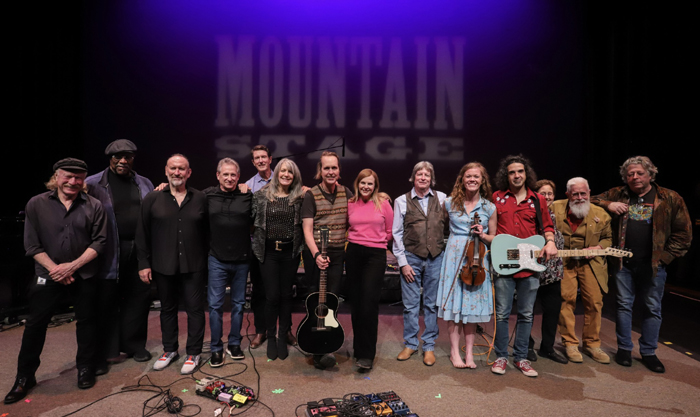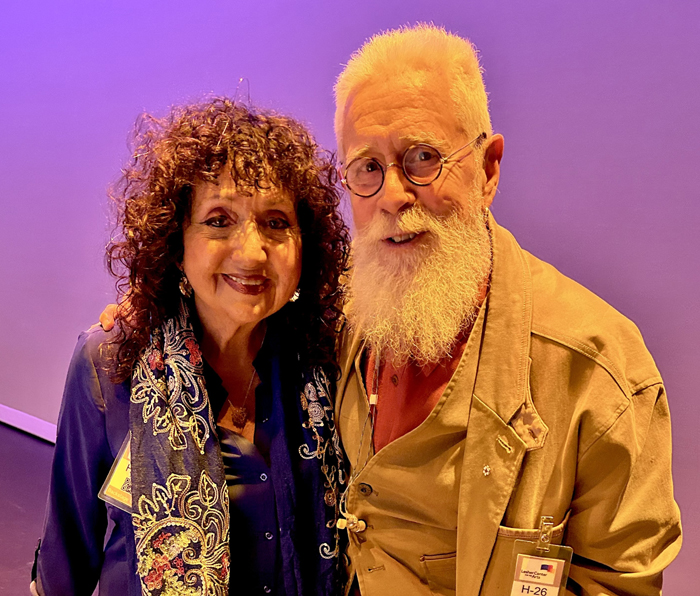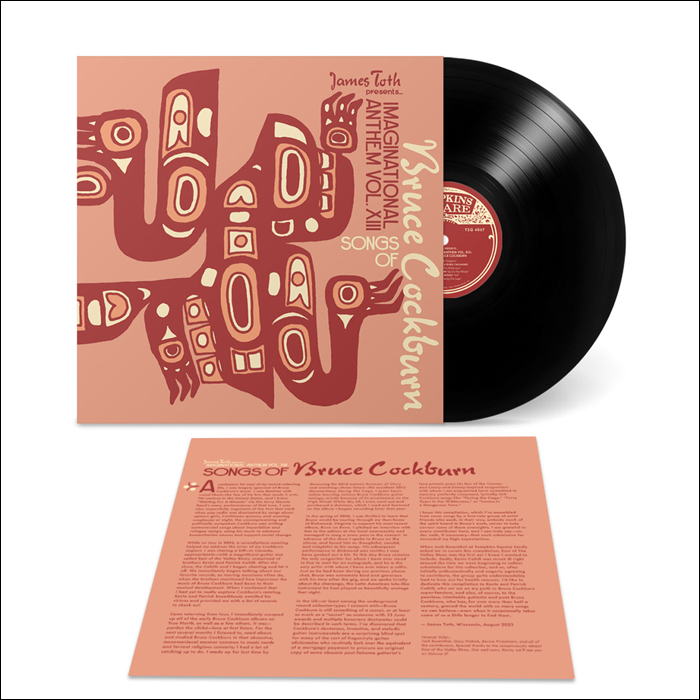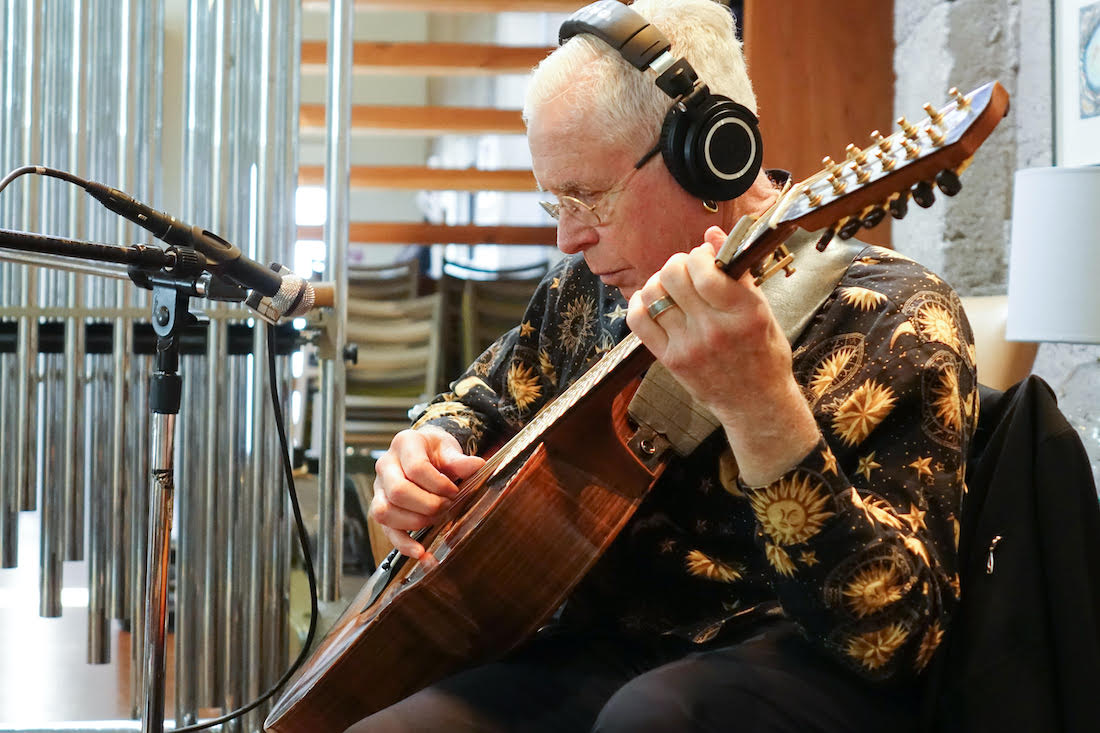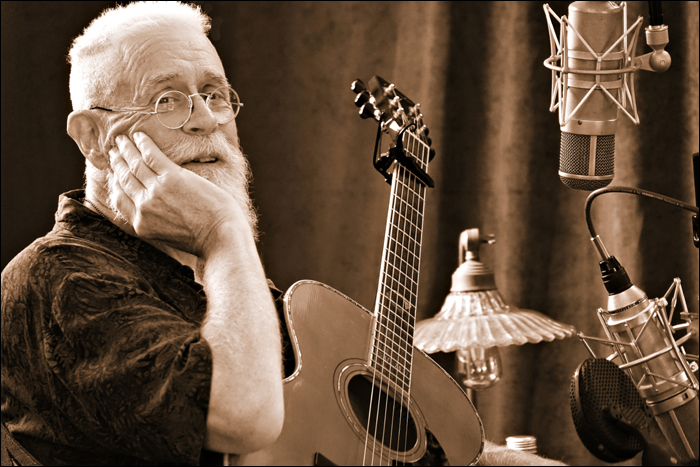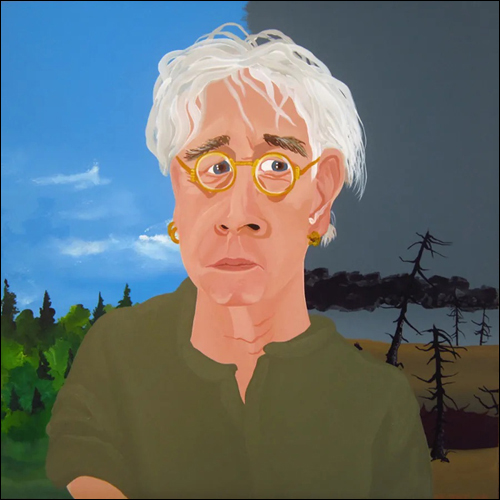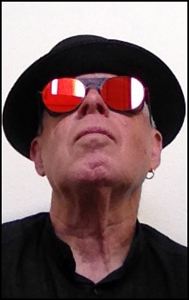ARTICLE CONTRIBUTED BY SAM A. MARSHALL | PUBLISHED ON TUESDAY, APRIL 16, 2024
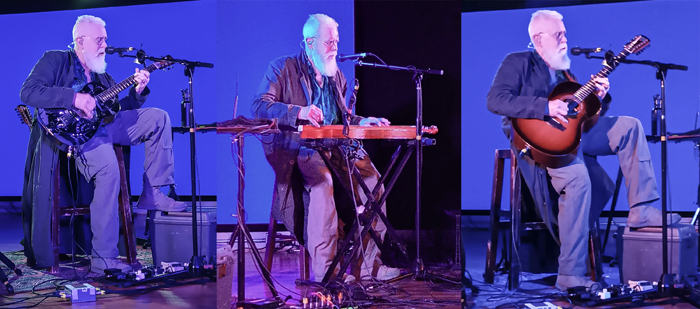
In May 2023, Bruce Cockburn – the highly prolific Canadian singer-songwriter active as a performing and recording artist since the 1960s – released his 38th studio album, O Sun O Moon. Then, not long after that, he began an extensive tour in support of the album that – extending to nearly 50 dates so far – has continued into the present year.
Between late April and early July this year, Cockburn will be logging nearly 25 new shows of his soul-stirring live performances in the U.S. and Canada. And since those dates only cover a clutch of cities in the Southwest U.S. and in Ontario, it’s reassuring for those of us most mindful of the passage of time that the now-78-year-old artist is charting out another run of North American shows for late fall.
Practically on the eve of this next run of dates that begins on April 24, in San Luis Obispo, CA, Grateful Web was most fortunate to have a personal conversation with Dr. Cockburn about the record and upcoming tour. (This took place on April 9, coincidentally the day after the great 2024 North American total eclipse.) This highly-awarded songwriter and performer – and, in fact, a holder of three honorary doctoral degrees in music – touched upon some his personal creative processes, his way of looking at the world and even a bit of the mysteries of existence – all ingredients in the making of O Sun O Moon.
When I attended one of Cockburn’s shows last year in Cincinnati, Ohio, still early on the 2023 tour, O Sun O Moon was certainly the main entree of songs on the menu that night. Yet, there was a good number of recognizable, fan-favorite songs and a few surprises on offer. Over the year since the album’s release and beginning of the tour, faithful fans of the master musical storyteller and guitarist have had a chance to become more deeply familiar with the new album. And – to my ears and mind at least – it may very well become as cherished as any of his most classic collections.
Although I was introduced to Cockburn’s music in the later 1970s, not long after his first few albums had been released, I’ve admittedly drifted in and out through different stages of his career. While I was off following other genres and more rock-oriented artists, I’d keep my ear cocked for what ‘progressive’ folk artists such as he and British folk-rock pioneer Richard Thompson would be up to next, even if l didn’t always listen to every album in depth. Initially more of an solo acoustic folk songwriter, he pursued a more obvious electric route with backing bands in the ‘80s, and in the MTV era even reached beyond his core audience with videos for such electrified rock activism songs as “Call It Democracy” and “If a Tree Falls”. Of course, some of that period drew me back. Yet, I’ve surely missed a good many things, so even now I feel as if I’m still catching up with Cockburn.
With my incomplete knowledge of Cockburn’s entire body of work, I’ve tended to gravitate toward his more rock-oriented releases, and a personal favorite is his 2002, You’ve Never Seen Everything. This album deftly balances ballads against some modern-rock grooves such as the rap-spiel opener “Tried and Tested”. And while there are moments of sweetness and light in the folk-style songs, there are more experimental moments, too, like the album’s title track – a chilling, nine-minute, film-noir-soundscape with spoken-word narration that takes the listener on a journey through a dark night of the soul. I also tend to listen more for his instrumentals and expressive, jazz-flavored guitar performances than for his lyrical songs, so I’ve also been highly impressed with his all-instrumental albums, 2005’s Speechless and 2019’s Crowing Ignites, which are both journeys of their own.
Recorded in Nashville with Cockburn’s go-to producer Colin Linden, O Sun O Moon seemingly reshuffles the deck on listener expectations – and mine. It’s an album of sublimely crafted acoustic songs, rich in musical textures, air, and light that never once leave one wishing for more electrical current. Through alternating modes of quandary, gravity, celebration, sardonic humor and emotional resolve, his poetic and minimalist lyrics explore questions of life and mortality, love and forgiveness, and our place in the world.
So, yes, personal themes abound on the album, such as making the best of the time one has left in life (“On a Roll”), the spirituality in everyday life (“Into the Now”) and looking ahead to the next adventure (“When You Arrive” – a joyous New Orleans’ waltz that not only serves as the album’s grand finale but is also a rousing live sing-along.)
In any case, the longtime social and political activist also hasn’t shied away from contemporary issues but allows them a space of their own on the album. One such song is the percolating, roots-y, climate-change tune, “To Keep the World We Know”, which he co-wrote with fellow Canadian singer-songwriter Susan Aglukark. And in the probing song about coming to terms with our fellow man and woman titled “Orders”, the perennial humanitarian seemingly answers the biggest question of all – “Why are we here?” – with unflinching directness.
Front and center, of course, is Cockburn’s warm and knowing but not-always-sweet voice, swathed in musical textures that range from soothing and inspirational to ones with more spit and grit. In fact, you might think that his song “King of Bolero” is a fair impression of Tom Waits. His guitar playing is also exemplary, although it never draws undue attention to itself. And both his vocals and instrumentation are kept good company with a fine ensemble of guest vocalists and musicians. Among these are Gary Craig, Sarah Jarosz, Jenny Scheinman, Buddy Miller, Susan Aglukark, Shawn Colvin and Jim Hoke.
O Sun O Moon is a satisfying emotional experience, from start to finish, and if you’re a longtime fan of this veteran songwriter, then you have very likely already moved it upward – if not all the way to the top – on your personal list of favorite Cockburn albums. If you happen to be still largely uninitiated to his musical universe, then this album – with its Zen-like sense of presence, sage wisdom and timelessness – is an excellent place to start your journey.
“One more time,” Cockburn urges his backing singers onward with a glimmer in his voice on the final, life-affirming refrain of “When You Arrive.” And when he plays it live, the whole audience joins in, shedding even more light into all the dark corners. Now isn’t that what friends are for?
GW: Glad you could make time to talk to us, Bruce. Our phone call seems very timely, since your recent album is called O Sun O Moon, and yesterday we had the total eclipse in the eastern U.S. A nice coincidence! I’m guessing that maybe if you’re near the East Coast right now, you were able to see the eclipse. If you did, I’m curious what your personal reaction to the that was.
Cockburn: Yes, in fact, I’m in Ontario at the moment. It was pretty amazing, actually.
GW: We enjoyed it in our area, too, and we could travel to where totality was without too much effort. Coincidentally, you often deal with imagery of stars and the cosmos in your lyrics, so one of the things I wanted to ask you about is the struggle between darkness and light in your songs. The album title and lyrics of O Sun O Moon seems to allude to that, but then you have a song like “On a Roll”, which seems to imply that maybe the light is winning this time. Would you say that’s true, or is it still always shifting for you?
Cockburn: That’s an interesting question. I haven’t exactly thought about things from that angle. My songs come from a pretty personal place, so, in my mind, they don’t automatically equate with larger philosophical observations. But, to phrase that question another way: “Do I feel myself to be an optimist or a pessimist?” In those terms, then I do tend to go back and forth.
In certain areas, in terms of individual spirituality, I’d say I’m an optimist. But in regard to the future of the planet, I’m more inclined to pessimism. The pessimism isn’t [giving in] and saying, “Ahh, what the hell! It’s all going down. . . .” It’s because I have grandchildren and also a young child, and I worry about the future for them.
The pessimism comes in where I don’t see as much being done to offset the threats that we’re faced with. Spiritually speaking, I do think there’s a kind of contest between dark and light, and I think that “On a Roll” is a celebration of the fact I feel like – at least while I was writing that song – that light will triumph. Also, that when I cross that boundary to whatever comes next, I’m gonna find myself in a good place. That’s what the hope really is.
GW: That’s good. An interesting thing about the new album is your sense of resolve in the lyrics. Thinking back to your [2011] album, Small Source of Comfort, I sensed that you were in a period of doubt and transition as a songwriter. After that you did one more lyrical album, Bone on Bone, and then next was the all-instrumental album, Crowing Ignites. So did the instrumental album serve as a kind of ‘palate cleanser’ for you, to give you a break from writing lyrics?
Cockburn: I suppose it could have had some of that effect. I had wanted to do a Speechless II, and the original Speechless was a compilation of previously recorded instrumental pieces from my various albums. So my intention was to write a few new instrumentals to go with the same concept, because I had recorded a lot of other instrumentals since the first Speechless came out. And we might still do that someday. But what happened is that once I started writing the pieces, they kept coming and I ended up with a whole album of new stuff that became Crowing Ignites.
So, yes, it was cleansing, and, perhaps, I also didn’t have so many pressing lyrical ideas at the time. It was fun to make an instrumental album and to think only in those terms. When it comes to writing lyrics, I can’t really force the issue very well. I’ve done it occasionally, and I haven’t liked the results very much. But with instrumental music, I can just pick up my guitar, start fooling around and look for things more actively than I can with lyrics. So it was fun to work on Crowing from that perspective.
GW: I do think there’s often a quality in your albums of forward motion, kind of a restless search. In a certain sense, some might consider that ‘progressive’. One of the things I get from O Sun is more of a contented feeling, maybe even a nostalgic flavor. Obviously, you reference your own sound. But it also seems as if you might be giving some stylistic nods to some of your formative influences, such as the Gypsy Jazz of Django Reinhardt and Stéphane Grappelli. With the accordion, vibes and violin, there are also hints of Astor Piazzolla and New Orleans blues and jazz. Would you say that this new album came to you more freely than some of your recent projects?
Cockburn: I guess I’d have to think back to what some of the other albums were like to work on, but this one worked out very smoothly. As I said, when writing lyrics, I wait around for ideas and for the ‘flash’ and little ‘gooses’ of energy that get it going. And when that happens, I’m very grateful.
Several of the new songs were written in Maui when some of my family, friends and I were there [a couple of summers ago]. We rented a house, and it was so calm with tranquil, beautiful surroundings, and good company. That was, of course, before the tragic fires in Lahaina. The effect of that atmosphere was like it popped the cork and out came all of these songs!
For example, two songs that were like that were “King of Bolero” and “Into the Now”. Another song, “Colin Went Down to the Water”, came about a little differently but also in that setting. There was – as I like to think of it – a certain amount of grace that went into the writing of the songs, very little conscious tugging at things to get them to happen.
The oldest song of this set of songs was “When You Arrive”, and the idea for that had sat around in my notebook a long time. Then, one day, it suddenly clicked, and I thought, “Oh, yeah!” And that’s how it works. I’ve had that experience with songs, from time to time. It’s not like I went back to them every day and said, “What I can do with this?” They’re just there, and then something would invite me back to revisit them, and then there it was. Whether all of this was easier than other albums, I’m not sure. I’d have to think back hard about how those songs came to be.
Even the recording [of O Sun]went pretty well, and that can sometimes be more difficult than the songwriting. One thing on this session is that I suffer from Meniere’s Disease, and my vertigo acts up at times. I’d have attacks of vertigo every day during the recording, and yet it came out all relaxed and cool. And – heh-heh – you won’t hear that on the record. We got lucky with that. It could have been worse! But, it was a very pleasant atmosphere at the studio where we recorded in Nashville. I stayed in a house where you walk across the yard, and then you’re in the studio. It made it all very workable and fun.
The way we approached it was that Gary Craig –my drummer and percussionist – and I recorded everything together. So he acted like a kind of human beatbox or human click-tracking, and he kept me in the right place rhythmically. So we had vocals and guitar, and some form of drums or percussion, and then we added people to that. And the great thing about it for me, in particular, is that I didn’t hang people up [during the sessions] waiting for me to get my shit together. And everybody contributed the most beautiful things.
Jim Hoke, the horn [and clarinet] player, walked in, really prepared, and he did the most amazing and beautiful horn parts. He started laying stuff down, and it was really magical, even though I was feeling like garbage.
GW: I’m glad you mentioned that. I wanted to ask you specifically about the horn, vibes and violin arrangements and how much of that you pre-composed. From what you say, it definitely sounds like you gave the musicians a blank page.
Cockburn: Yes, I’ve always taken the approach that you hire somebody based on the fact that you like what they do. So I just see what they’re going to do. And if something isn’t working, then I’ll intervene and say, “OK, how about more of this, or less of that?” But, generally, with the calibre of people we’ve had coming in, that hasn’t been much of an issue.
Sarah Jarosz came in and sang and played great. And (violinist/vocalist and previous Cockburn collaborator) Jenny Scheinmann – we got lucky with her, because she just happened to be in Nashville at the same time. We had no budget to fly people around. We had to use people we had access to, and Jenny was someone I’ve worked with a lot in the past.
GW: Yes, I saw her warm up and perform with you in Michigan in 2011, so I know just how good she is.
Cockburn: There was a lot of magic like that around the making of the album, and a lot of really good feelings.
GW: Briefly, I’d like to have you touch upon your own musical training and education. For example, I know you studied jazz guitar at Berklee School of Music early in your career (mid-1960s). Just curious whether you always approach your songwriting from a theoretical perspective, or, for example, if you like to experiment and create new harmonies using altered tunings?
Cockburn: I do use some different tunings, although for a long time I didn’t. Way back near the beginning, I did use ‘open C’ and that’s the tuning I use on “Soul of a Man” (Note: This is a song that Cockburn has been performing on his recent tours). I learned that song in the ‘70s from the Blind Willie Johnson record. But I had observed the tuning from watching the Reverend Gary Davis. But other than that, I steered away from using open tunings back in the early days because I was hearing a whole lot of people who really couldn’t play guitar using those tunings to make the songs sound different from each other. And – heh – that didn’t work very well as that kind of function.
So I didn’t want to get stuck in that. For me later on, that ceased to be an issue and I just started exploring other tunings. That’s especially evident on Crowing Ignites. And there’s a song on this new album that’ s in what I call “E-GAD”. It’s DADGAD (six-string) tuning with the low string left in E instead tuned down to D. That gives you a nice combination of fourths and modal harmonies that you can move with, kind of like [jazz pianist] McCoy Tyner. Y’know, I’m not comparing what I do with what he did. . .
GW: Right. I understand, though, that you’re augmenting your harmony by changing the chord voicings. . .
Cockburn: Yeah, and it applies on some other songs, like the “King of the Bolero”, “When Push Comes to Shove” and maybe another one. Sometimes, all you have to do is change [the tuning of] one string, and then that suggests some new kind of riff that you hadn’t stumbled on before. And that can become the basis for a new song.
GW: As I’ve seen from setlist.fm – if that website is at all reliable, your sets over the last year have remained fairly fixed since the start, with a focus on O Sun O Moon and a pretty consistent selection of your other historical songs. I’m curious whether you’ve been writing any new songs in this period and trying any of them out live, and whether you feel like another album is possibly taking shape.
Cockburn: Not really. . .I’m not ruling out the possibility of doing another album. I’ve just been busy doing what I’m doing, and the energy that might have gone into songwriting – some of that’s gone into figuring out new ways of doing songs that my arthritic hands won’t do very well now.
Songs that I’m doing are the ones that people would want to hear. I had to come up with a new way of playing “All the Diamonds in the World”, for instance, and “Pacing the Cage” and a couple of other things that people are always asking for. For a long time, I’d have to say, “No, sorry, can’t do it because my hand won’t make those chord shapes. And that’s one area where using alt tunings can be very helpful.
So, I’ve been doing some of that [re-arranging] and that’s been taking up some of the songwriting energy. But it’s worked, and I’m able to play those songs now. Whether people approve of the change in my guitar [parts], I don’t know. There are a lot of guitar players who’ll come to the shows, and they’ll see that those aren’t the same shapes they’ve seen me do before. But I think the music works now, and hopefully they’ll think so too!
GW: As you were writing O Sun O Moon, life was obviously going on all around us. Global warming, for example, is obviously a big modern problem that you call out in the album, and you alluded to other things such as the Covid period of 2020-2021. So do you like to be more indirect now in your observations or do you still like to be blunt, as you were with “All Our Dark Tomorrows” or “Trickle Down” (Two overly political songs from You’ve Never Seen Everything.)?
Cockburn: I think it depends on the circumstances and what kinds of ideas come to me. I don’t have any specific ‘policies’ about that. It’s just what comes up. Susan Aglukark approached me about co-writing a song. And her idea about “To Keep the World We Know” was about global warming, and that song was much more intentional than I usually am. It’s because another person was involved, and it was her idea. Not the title, but she had some phrases and the concept. She wanted us to write a song about wildfires. I kind of took the ball and ran with it, and then we tossed its back and forth – over the phone, by email, etc. – and we came up with that song. I think it worked out well, but that’s quite specific and pointed.
In terms of what the song’s talking about, it doesn’t name people. But the problem [of global warming], of course, is bigger than just calling out people’s names. To single out certain decision makers for a song like that would be pointless, because they’re all screwing it up. Who’s your ‘bad guy’ today? The ‘bad guy’ is the money interests that are financing our politicians and financing their policies. That’s hinted at in the song, but that’s the enemy and it’s how we handled it.
GW: Touching on your repertoire in more detail, I wanted to ask you a bit more about your fans’ expectations. You mentioned before that fans ask for songs, but you’re not always able to play them now, even if you want to. Which songs from your history do you enjoy playing the most, and which ones, if any, would you like to ‘retire’?
Cockburn: Ohhhh, there’s – heh-heh – um, I don’t think I’d necessarily want to name specific songs. But, really, not because I don’t like the songs, but when I’m thinking of putting a show together, there’s always a short list of songs that have to be in the show. And sometimes I find that kind of confining. So it would be nice to just not do them. For a while, anyway, and have them come back later.
In a way, that happened with “All the Diamonds”, “Pacing the Cage” and “Lord of the Starfields”. They’re all songs that because of the [chord] fingering of the original versions, I could sort of play them, but they didn’t come out well. They were all sort of messy sounding. So I had to come up with new ways of playing, and that made them fresh again.
Having to not be able to play them for a couple of years, at least — it’s been about that long that I’ve had this problem. So people would call out especially for “Pacing the Cage” and I’d really [regret] not being able to do it. I’d say, “I’m really sorry, but I’m working on it.” So that was one that got a rest and then it feels to play it again – feels good. With “All the Diamonds”, I did go through a phase where I hated that song – not as a song, just having to play it. But that was years ago, and I got over it.
Some [older] songs are lighter and they don’t require quite as much from me to perform them. I don’t have to go quite as deep to perform them as I do with “Pacing the Cage”, y’know, to make them meaningful in performance. I’m happy I got a rest with “Pacing” because it’s not a happy song, and I have to go back to where I was emotionally when I wrote the song.
GW: You’re being kind of a ‘method actor’ then?
Cockburn: Yeah, I’m in the emotional state of when I wrote those songs in order to make them mean anything. It’s not by choice, either. It’s just what happens. It is how I feel I have to do it to make the songs real for people who are listening. Some of the songs are less pleasant to do that with than others. It was helpful to have that break.
GW: Looking ahead, could you share what your plans are for more tour dates beyond this next tour, which I know ends in early July?
Cockburn: My wife and family are probably going to want me to take some time and go somewhere, because she’s the one who needs the break. So I’m sure we’ll get away somewhere, and that might involve going back to Hawai’i. We’re looking at possibly adding some dates in the Southeastern U.S., in the November timeframe. Not confirmed yet, but that’s the general plan.
GW: Wrapping up then, Bruce, with one last philosophical question, coming back to the question of darkness and light. Obviously, with your faith, you have often expressed a fascination with the nature of existence, cosmic questions and starlight as a symbol. So time and again, you’ve shared your own spiritual outlook that seems certain but still allows room for the listener’s interpretation. Do you think we go to a good or a bad place when we die, or do you think we all become stars?
Cockburn: No, I don’t think we become stars. But I do think it’s very possible that we become [another form of] energy. And one point of view is that the energy we experience as living creatures dissipates and goes somewhere after our bodies die, right? Because, as we know, energy is not created or destroyed. The body goes to bits but the energy goes somewhere else. Whether it retains a consciousness or sense of its own identity is a different question altogether.
Some people think that it doesn’t, but I think it does. I do think there is darkness in the universe and you don’t have to look far to find it. I can buy into the Christian viewpoint, but I don’t think there are literally Pearly Gates or streets paved with gold. I think that’s a metaphor for something beautiful. And I kind of see it as involving a connection with the Divine and the ruling principle of the cosmos, which is a beautiful and loving presence.
I think when you look at a starry sky and you are moved emotionally by that, what’s moving you is your sense of connection with the bigness of everything. I think bodies get in the way of that, so if you get the body out of the way, then your relationship with that will become more direct, pure and accessible.
GW: Thanks, Bruce, for sharing some of your perspectives on what goes into your songwriting. Your imagery of stars is one of the things that stands out for me in your songs, and I appreciate hearing more of your thoughts about that.
Cockburn: There’s an incredible amount of beauty and energy out there. And who knows? We may all get swallowed up in a black hole!
Photo: Bruce Cockburn in focus, in 2023 | Photo: Shannon Stevens, Cincinnati OH | Composite: Sam A. Marshall
Bruce Cockburn Tour Dates, Spring-Summer 2024
Credit: https://www.gratefulweb.com/articles/grateful-web-interview-bruce-cockburn




